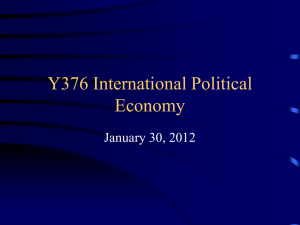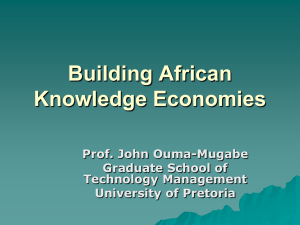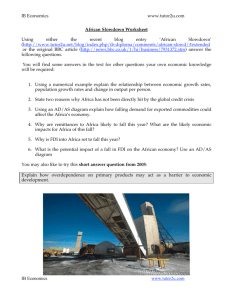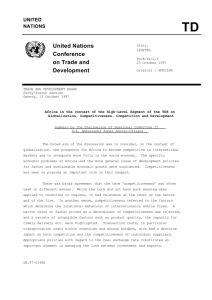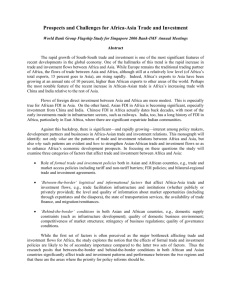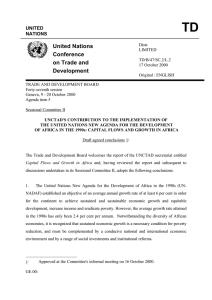TD United Nations Conference
advertisement
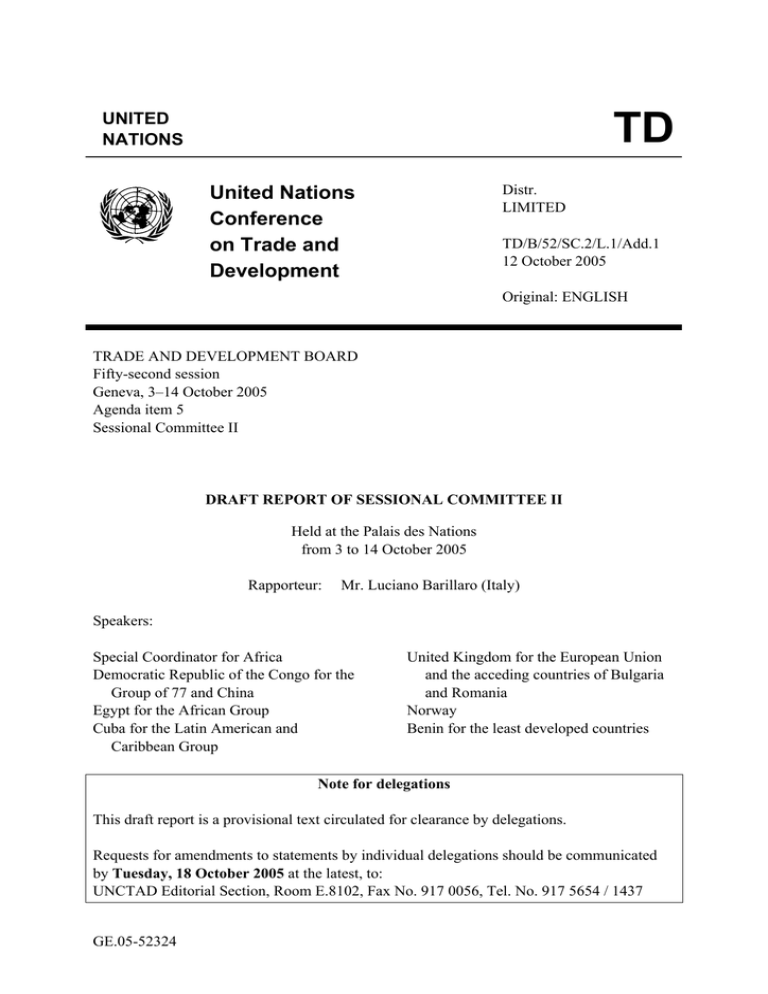
TD UNITED NATIONS Distr. LIMITED United Nations Conference on Trade and Development TD/B/52/SC.2/L.1/Add.1 12 October 2005 Original: ENGLISH TRADE AND DEVELOPMENT BOARD Fifty-second session Geneva, 3–14 October 2005 Agenda item 5 Sessional Committee II DRAFT REPORT OF SESSIONAL COMMITTEE II Held at the Palais des Nations from 3 to 14 October 2005 Rapporteur: Mr. Luciano Barillaro (Italy) Speakers: Special Coordinator for Africa Democratic Republic of the Congo for the Group of 77 and China Egypt for the African Group Cuba for the Latin American and Caribbean Group United Kingdom for the European Union and the acceding countries of Bulgaria and Romania Norway Benin for the least developed countries Note for delegations This draft report is a provisional text circulated for clearance by delegations. Requests for amendments to statements by individual delegations should be communicated by Tuesday, 18 October 2005 at the latest, to: UNCTAD Editorial Section, Room E.8102, Fax No. 917 0056, Tel. No. 917 5654 / 1437 GE.05-52324 TD/B/52/SC.2/L.1/Add.1 page 2 ECONOMIC DEVELOPMENT IN AFRICA: THE ROLE OF FOREIGN DIRECT INVESTMENT IN GROWTH AND DEVELOPMENT (Agenda item 5) 1. For its consideration of this item, the Board had before it the following documentation: Economic Development in Africa: Rethinking the Role of Foreign Direct Investment (UNCTAD/GDS/AFRICA/2005/1). 2. The Special Coordinator for Africa said that the issue of foreign direct investment (FDI) was a complex and controversial one even in the developed countries, as illustrated by the controversies surrounding the decision of Hewlett Packard to reduce its workforce in France by more that 1,000, and by the proposed takeover of an American oil company by a Chinese firm that was aborted because of concerns about national security. The objective of UNCTAD's report was to identify and evaluate the response to policies to attract FDI inflows implemented in Africa over the past quarter of a century within the context of wide-ranging macroeconomic reform programmes. Average annual FDI flows to Africa had increased ninefold from about $2 billion in the 1980s to about $18 billion in 2003 and 2004, mainly because of new large petroleum and mining projects. However, FDI flows remained low in terms of total global and developing world flows; and up to 80 per cent of total FDI to Africa was concentrated in natural resource extraction, and did not appear to be having the desired developmental effects because the projects it supported were capital-intensive and lacked linkages to the rest of the economy. The fiscal impact had been limited to relative export values generated, and environmental and social costs exacerbated the costs of hosting FDI in the mining sector. In a number of countries, profit remittances exceeded total FDI inflows, sometimes to a very considerable degree. While, from a corporate perspective, the outcomes of recent reforms in the mining sector in Africa were positive, considering the level of incentive offered by host countries, there appeared to be a “race to the bottom”. The scale of FDI, and the benefits from it, depended on attaining certain thresholds of a variety of macroeconomic, institutional and structural conditions in the host economy; FDI was, in effect, more of a lag than a lead variable in the development process. 3. The report drew attention to the need for macro policy space for African countries to implement policies that enabled them to derive maximum benefits from FDI inflows. The report of the Commission for Africa recognized that the quality of government intervention hinged on strong local state capacities, and underscored the need for a flexible approach to promoting long-term growth with the precise mix of policies tailored to country specifics. A rethink of policies to attract FDI was required: it was necessary to take seriously the costbenefit perspective; mix and sequence strategic industrial policies; process resource-based exports at the domestic level in order to create value added and deepen industrial capacity; give priority to domestic capital formation; harness FDI to ODA-led infrastructure programmes in order to generate a substantial financing push; and support regional trading arrangements to help promote trade and investment links through the creation of larger markets. A fresh look at the East Asian experience, where industrial policies, FDI and TD/B/52/SC.2/L.1/Add.1 page 3 regional dynamics were, to varying degrees, part of a late industrialization drive, could also provide useful lessons. 4. The representative of the Democratic Republic of the Congo, speaking on behalf of the Group of 77 and China, said that the analysis of the development impact of FDI raised fundamental questions regarding its costs and benefits, for example how FDI could be fully utilized as an engine of development and how FDI targeting could be enhanced to contribute to development. The secretariat's report suggested that the State's increased shares in the profits of mining, gas and oil companies should be directed to development-related activities. Also, FDI should contribute to the diversification of the productive base, together with the application of trade and industrial policies conducive to broad-based development. UNCTAD could help in this regard through its policy analysis work and technical assistance. There was a need for a stronger ethos of corporate developmental responsibility and good corporate governance of transnational corporations, so as to ensure that the business sector would be a positive agent of development. The policies of investors' countries to encourage private flows and technology transfers to developing countries could reinforce this effect. UNCTAD's policy analysis in this area could help in the implementation of tailored development strategies. The speaker emphasized that African countries must have enough policy space and that the prescription for good policies without adequate policy space sounded like a nostalgic call for the resurrection of the one-size-fits-all approach to development, the now discredited Washington Consensus. 5. Debt relief was another sector that could positively impact on a global approach to development. The G-77 and China welcomed the initiative of the Gleneagles G8 summit to cancel the multilateral debt of the HIPCs, and to increase aid by $48 billion a year by 2010. These proposals had been endorsed at the recent World Summit in New York, and reiterated at the autumn World Bank and IMF annual meetings. The renewal of commitments by OECD countries at the World Summit and the initiatives on new financing sources were in line with the concerns about African problems and overall development, and should be addressed up to the highest levels. UNCTAD was called on to carry out substantive work in the framework of debt relief for highly indebted poor countries. 6. Trade was another area where Africa stood to gain. African export potential was not fully exploited within South–South trade. The Global System of Trade Preferences (GSTP) and the New Asian-African Strategic Partnership (NAASP) were mechanisms that could help to develop trade potentials and interregional cooperation, with UNCTAD's continuing support. In conclusion, the speaker recalled that the Doha Plan of Action of the South Summit requested UNCTAD to organize forums on South–South investments, to plan this event in 2006 and to present a report on intra-regional investment flows. 7. The representative of Egypt, speaking on behalf of the African Group, said that the report followed a tradition of sound and challenging analytical work conducted by the secretariat, which had brought alternative perspectives to bear on the conventional wisdom with respect to African economic development issues. If UNCTAD was to speak with one voice, it must be the voice of development, as this was the institution's established mandate, traditional role and real comparative advantage. The analysis of the facts regarding the role of FDI flows to Africa in the report went beyond a statistical presentation of the magnitude of FDI in the continent and provided a developmental rather than a corporate perspective on the impact of those flows. The report raised a number of concerns. First, despite wide-ranging TD/B/52/SC.2/L.1/Add.1 page 4 economic reforms undertaken by African countries during the past two or more decades, FDI inflows had actually declined from 4.4 per cent during the 1970s to about 2.0 per cent during 2001 and 2003, and were a fraction of the FDI attracted by smaller countries such as Belgium and Luxembourg. Second, inflows were concentrated in natural resource extraction; and, third, the positive impacts, including associated developmental effects, usually attributed to FDI, had not materialized. The corporate social responsibilities of TNCs were therefore of vital importance, and brought into focus the ideas contained in the São Paulo Consensus as well as the Doha Plan of Action and the second South Summit, which needed to be translated into reality by relevant institutions such as UNCTAD. Since the benefits of FDI depended on reaching certain thresholds with regard to a variety of macroeconomic, institutional and structural conditions in the host economy, there was a need for African countries to establish a “developmental state”, including the implementation of policies to reinvigorate publicsector investment as a basis for kick-starting growth; establishing a more dynamic profitinvestment nexus; and deepening internal integration. This made strategic industrial policies imperative, and greater macro policy space for African Governments was required. Complementary international support action was also critical. Proposals by the G8 Heads of State and Government at the Gleneagles Summit in June 2005 in respect of increasing aid flows and cancelling 100 per cent of multilateral debts of the heavily indebted poor countries were applauded, as was the renewal of the commitment by a large number of OECD countries at the 2005 World Summit to achieve ODA targets within stated time limits. The principle of "additionality" enshrined in the HIPC debt relief framework (to which the G8 leaders and the Bretton Woods institutions had committed themselves) should be upheld; and no new conditionalities should be imposed on the potential beneficiaries of debt relief. 8. The Doha Round should be concluded in Hong Kong (China) in December 2005 as a truly developmental round that instituted free and unfettered liberalization in international trade in agriculture. UNCTAD should continue to undertake critical and in-depth analysis and provide policy advice on African development, including attaining the MDGs and implementing NEPAD. The intergovernmental consensus-building pillar of UNCTAD must be fully utilized in order to contribute to more effective and beneficial technical assistance and capacity building for Africa. 9. The representative of Cuba, speaking on behalf of the Latin American and Caribbean Group, said that 71 per cent of LDCs and 32 out of the 38 most indebted countries in the world were African countries. Trade liberalization had destroyed economic structures in Africa, while these essentially agricultural economies had to compete on an unfair basis with large industrialized countries, which heavily subsidized their producers. Local industries had been disappearing and unemployment increasing. These facts indicated the magnitude of the challenges ahead and the urgency for international debates to be translated into specific actions. African countries could not generate the necessary internal savings for the adoption of economic development strategies, and private capital flows should not be used for long-term strategies. Unsustainable debt reduced the capacity to attract foreign and domestic investment, and therefore prevented growth and limited public investment in infrastructure, basic services, human resources development and any other expenditure for poverty reduction. The continent was suffering continuing emigration of its population, losing professionals and technicians. Despite Africa's rich natural resources, it faced problems related to underdevelopment, such as poverty, hunger, illiteracy, poor health and conflicts. The wealth of the continent could contribute to its economic development, but TD/B/52/SC.2/L.1/Add.1 page 5 for that to happen, African countries needed assistance, finance and investment, as well as the promotion of their own integration mechanisms. 10. Developed countries and international financial institutions argued that Africa needed to create an environment of greater economic freedom and greater security in terms of property rights in order to attract investment. However, it appeared from UNCTAD´s report that focusing on attracting FDI could be bad for a development policy and in some cases could even distort long-term economic potential. FDI had become the preferred way of development finance in Africa in the hope that it could compensate for the investment deficit without increasing external debt and provide employment, export opportunities and new technologies. Foreign companies had even received incentives which were similar to subsidies, at the expense of policies that tried to encourage national companies and domestic investment. However, Africa had received only a very small proportion of global investment flows. The record of the adjustment programmes of the last 20 years did not support the idea that opening up to foreign companies would transform the investment climate in Africa. These programmes did not help to modify the structural features of the region or to integrate it positively into the world economy, while they clearly failed in restabilizing a favourable economic climate for investment and employment. The idea of attracting greater FDI was still valid as one of the results of the neoclassical view of development, although it could generate costs as well as benefits. Structural distortions and macroeconomic limitations had consolidated a FDI regime that was characterized by low value added and insubstantial reinvestment of profits. Africa still had a difficult task in balancing the benefits and costs of FDI, and avoiding speculative investments that sought rapid returns with a short-term horizon. Internal capital accumulation had to be reactivated. Coherent international trade, financial and monetary policies were needed, as well as policy space for African countries to apply their own strategies in order to develop their endogenous capacity to generate resources and improve their production and trade performances. 11. The representative of the United Kingdom, speaking on behalf of the European Union and the acceding countries of Bulgaria and Romania, said that primary responsibility for African countries' development lay with those countries themselves. In a spirit of partnership, the EU supported NEPAD through coordinated and targeted aid policies among donors, and was willing to cooperate with the African Union in the efforts to achieve the MDGs. It was hoped that, together with the World Bank's Africa Action Plan, the European Council's meeting in December 2005 would provide a framework for the EU's assistance to Africa. There was a great challenge in terms of peace, security and governance. More efforts must be made to promote peace and security in all stages of the conflict cycle, namely conflict prevention, conflict management, conflict resolution and, most importantly, post-conflict reconstruction. The EU had established the Peace Facility for Africa, to which 250 million euro had been given in 2004. A part of the fund had already been used for peace support efforts in the Central African Republic, as well as for the capacity-building activities for the African Union's Peace and Security Directorate. Another building block for partnership was the EU-Africa Forum on Human Rights. With regard to economic growth and trade and their interconnection, the speaker highlighted the importance of macroeconomic and structural policies that would encourage private investment and pro-poor growth. 12. The EU had no intention of imposing policies on African countries, and certainly not a one-size-fits-all approach, but there was a need for some sort of framework. The speaker TD/B/52/SC.2/L.1/Add.1 page 6 noted that there had not been much discussion in the Board about the Euro-Africa Business Forum, which had brought together entrepreneurs, public and private, from Europe and Africa to discuss foreign as well as domestic investment. In addition to North–South trade in long-distance markets, African countries should explore the possibilities of expanding South– South trade among neighbouring countries. Recently, the issue of preference erosion had been referred to more frequently, and the EU was willing to discuss it with its trade partners. The speaker was hopeful about the Enhanced Integrated Framework for the LDCs, discussed in the Development Committee of the World Bank and the IMF at the end of September. He was willing to discuss the question of what is called trade adjustment costs of developing countries. Also, he underlined the importance of regional trade agreements as well as that of bilateral ones. 13. Referring to UNCTAD's Africa report, the speaker said that the EU member States were slightly disappointed with it, not because of its factual accuracy, but because it gave the general impression that FDI was bad. It could have been more positive if it had indicated that FDI could be useful if the conditions were right. The report should have been more careful about policies for attracting FDI by including discussion of foreign as well as national investors. The speaker agreed with the report's suggestion that a regional approach be used to attract FDI. It might be interesting to see the effects of debt cancellation on domestic savings in developing countries. The speaker expressed his interest in acquiring more knowledge about the recent proposal for a debt-for-equity swap put forward by the Group of 77, pointing out that similar proposals had been attempted and had not proved very successful. In conclusion, he suggested that the UNCTAD secretariat look into the privatization of public sector services (such as water, electricity and telecommunications) in the context of the effects of FDI. 14. The representative of Norway expressed appreciation for the high quality of UNCTAD's report on economic development in Africa, and noted that although the share of developing countries' FDI had increased, the World Investment Report showed only marginal changes in Africa's share of global FDI. In many African countries ODA continued to play a predominant role in capital flows. Norway was greatly concerned that many African countries were behind schedule with regard to meeting the MDGs. Public money and development assistance were necessary ingredients in effective poverty reduction, but they were far from sufficient. In addition to a sound and predictable investment climate, supportive macroeconomic policies and institutional and legal frameworks, local authorities should ensure the presence of good governance, political stability and a solid physical infrastructure. 15. Norway had made education a prime target because in addition to an investmentfriendly environment and natural resources, assets such as skilled labour and a strong educational system were needed to attract an increased level of FDI. Norway would continue its substantial assistance to the World Bank, UNCTAD and other multilateral agencies that provided technical assistance and promoted capacity building in developing countries. Referring to the importance of reversing the unfavourable investment pattern in Africa, the speaker noted that recent initiatives aimed at putting an end to neglect of the continent. The Commission for Africa and the G8 countries' Partnership for Africa were encouraging developments. Stressing that LDCs should be given top priority in UNCTAD's activities, she said that her country was greatly concerned by recent figures showing that only 15 per cent of UNCTAD's resources for technical assistance was allocated to Africa. TD/B/52/SC.2/L.1/Add.1 page 7 16. The representative of Benin, speaking on behalf of the least developed countries (LDCs), said that a number of development challenges faced by Africa could be addressed only in a favourable international environment. Although Africa's population constituted about 13 per cent of the world's population, the continent received only a little more than 1 per cent of FDI and accounted for only about 1 per cent of world GDP. In the light of present performance and bearing in mind the MDGs, the international community should provide a clear answer and concrete solutions to the framework problems faced by Africa. The financing of development was essential for African countries, where internal resources were meagre and the external debt burden weakened the capacity of Governments to undertake the necessary investments. More assistance was required, including debt forgiveness. In this regard, the LDCs appreciated the recent decision to cancel their foreign debt. However, this should be complemented with investments at a suitable level to promote economic development by providing finance for roads, energy, drinking water, sanitation, schools, irrigation, fertilizers, and so forth. These investments should lay the foundations for sustainable growth. 17. It was urgent to strengthen and diversify the production capacity of African countries. While this requirement was not new, it was more urgent today than ever before. The harmonious integration of Africa into the world economy required more competitive and technological capacities. In that connection, FDI was of major significance. The secretariat had shown that regional cooperation could bring about greater financial stability as well as better planning for infrastructure building and greater industrial development. All these elements could contribute to improvement of local enterprises and promote foreign investment. African economies experienced structural constraints, and there was thus a need for a regional policy to address the provision of infrastructure. 18. In conclusion, the LDC Group would like to thank UNCTAD for the work undertaken to assist in strengthening and promoting trade capacity in Africa. It would like UNCTAD's assistance to be extended to other forms of cooperation, for instance training in multilateral commercial diplomacy, debt management and targeting of investment, as well as initiatives to support production and diversify commodities. *** ** ***


